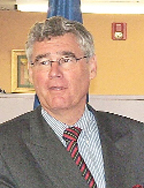– Ambassador
Guyana will most likely not be able to regain any of the 6 million euros ($1.6 billion) that it lost in budgetary support from the European Commission (EC) after the late submission of a sugar action plan.

Ambassador of the Euro-pean Commission to Guyana Ambassador Geert Heikens told reporters yesterday that to the best of his knowledge, the sum of money lost is not retrievable. He also said that as far as he is aware, the Government of Guyana did not give any reason for the delay in the submission of its action plan.
According to the ambassador, Guyana failed to meet all the necessary criteria, which he stated was interpreted with some form of flexibility. Heikens said that one such criterion was that GuySuCo had to approve its business plan before 1st January 2008. He said that the body had been given an extension up to March 31, 2008 but he said this plan was only received some time in July, when it was too late.
The ambassador also explained that the sector had to present an expenditure framework for sugar between the period 2009-2011 which was not met.
He said that the total envelope for 2007 which had to be paid in 2008 was 34 million euros but he stated that 6 million of this was not disbursed.
Persaud on Tuesday told this newspaper that he believed that the lost funds were still accessible. Speaking during a break at the ACP sugar conference, the minister said that Guyana is currently negotiating with the EU delegate here to access the remaining tranche from 2007/2008, but would not elaborate on the status of the talks.
Guyana is not the only country facing the same problem with disbursements, Persaud said. He stated that the current forum at the sugar conference has been used by other ACP countries to raise similar concerns about the accompanying measures provided by the EU as preferences for the region’s sugar erodes.
Heikens, however, emphasized that the country’s sugar sector will continue to benefit from continued support in the near future.
Meanwhile, the ambassador outlined the importance of political co-operation between the Government and the EC and said that there exists a healthy relationship between the two bodies. He, however, underscored the importance of political dialogue and according to him such dialogue should take place at least once a year where issues such as human rights, democracy and rule of law are discussed. In June/July, the EC is expected to host its first political dialogue with the Ministry of Foreign Affairs.
The ambassador also underscored the EC’s dedication to development co-operation with Guyana and the region. He disclosed that the Ninth European Development Fund (EDF) is near completion and the money allocated was valued at almost 62 million euros. The amount in the Tenth EDF is 55.4 million euros.
He said that a large percentage of this money goes towards general budget support. For the ninth EDF almost 40 million went to the budget, the ambassador said. However, he said 12 million euros has not been disbursed as yet since the body is awaiting approval of cabinet of the Poverty Reduction Strategy Paper and waiting for implementation of rules regarding public finance management system, which were described as imperative.
Additionally, he said that in the Ninth EDF, a significant part of the sum of money also goes to sea defence. He said that contracts worth about 17 million euros will be signed in relation to this particular aspect. For the tenth EDF, 30 million euros was set aside towards budgetary allocations while 15 million has been set aside for sea defence, Heikens disclosed.
Christopher Inglebrecht, Head of the Technical Sector of the Delegation of the European Commission, explained that these projects are undertaken in partnership with the government. He said critical areas would be identified and presented to the delegation. He said the body had to selective and prioritise the work that needed to be done based on proper assessments.
Speaking at the regional level, the ambassador disclosed that 165 million euros has been set aside in the Tenth EDF for the region. He also disclosed that a substantial amount of money has been set aside to help countries in the region towards the implementation of the Economic Part-nership Agreement (EPA).
Heikens, meanwhile, stated that when it came to regional programmes, there was some concern at the speed at which some projects were implemented.
Meanwhile, when asked if additional financial aid could be supplied, in the light of concerns raised recently about more funding being required in some areas, the ambassador said additional aid was not possible but the commission is looking at mechanisms to disburse the funds at a quicker pace. He agreed that the process to access and to disburse funds could be simplified but pointed out that adhering to the current procedures “was not all that difficult.” He also emphasized that the money provided by the EDF is secured.
The press conference was held at the Delegation of European Commission’s Office at Sendall Place. Shar-ing the head table with the ambassador were Inglebrecht, Head of the Technical Sector, the Dele-gation’s Agro-Economist Giampiero Muci and Ewout Sandker, Head of the Regional Sector.




